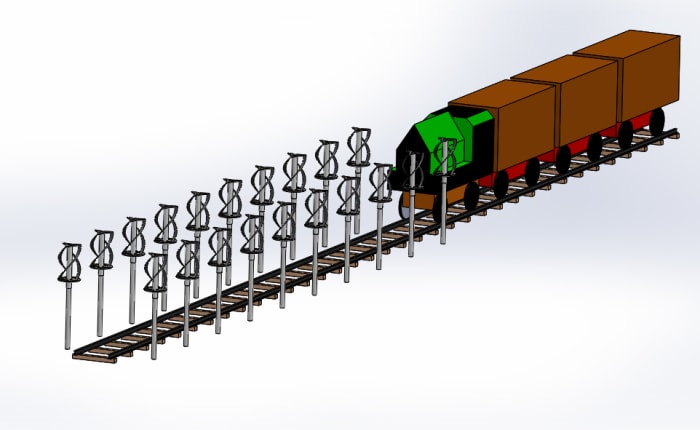Automaker Confusion: Navigating The Complexities Of Trump's Tariffs

Table of Contents
The Initial Impact of the Tariffs on Automakers
The immediate effect of Trump's auto tariffs was a dramatic shift in the automotive landscape. Import and export prices for vehicles and parts fluctuated wildly, creating instability for businesses and consumers alike. Foreign automakers, heavily reliant on importing components and exporting finished vehicles, were particularly vulnerable. Domestic automakers, while benefiting from some protectionist measures, still faced challenges due to the interconnected nature of the global automotive supply chain.
- Increased costs for imported parts: Tariffs significantly increased the cost of importing essential components, forcing automakers to absorb these costs or pass them on to consumers through higher vehicle prices.
- Higher vehicle prices for consumers: The increased costs of production inevitably led to higher prices for new vehicles, impacting consumer affordability and demand.
- Reduced sales and profitability for some automakers: The combination of higher prices and reduced consumer demand resulted in decreased sales and lower profitability for many automakers, particularly those heavily reliant on import/export.
- Shift in production strategies for some companies: Some companies responded by shifting their production strategies, relocating manufacturing facilities, or exploring alternative sourcing options to mitigate the impact of the tariffs. This often involved significant investments and strategic re-evaluations.
Navigating the Legal and Regulatory Maze
Complying with the complex web of Trump's auto tariffs and related regulations proved challenging for automakers. The legal and bureaucratic hurdles were significant, requiring substantial resources and expertise to navigate successfully.
- Section 232 investigations and their implications: Investigations launched under Section 232 of the Trade Expansion Act of 1962 significantly impacted the automotive industry, leading to tariffs justified on national security grounds. These investigations often involved lengthy processes and unpredictable outcomes.
- Compliance costs and bureaucratic hurdles: The cost of compliance, including legal fees, consulting services, and administrative overhead, placed a substantial burden on automakers of all sizes.
- Lobbying efforts by automakers to influence tariff policy: Automakers engaged in extensive lobbying efforts, attempting to influence tariff policy and secure exemptions or waivers to protect their interests.
- Legal battles over tariff classifications: Disputes arose over the classification of certain automotive parts and components, leading to legal battles over the correct application of tariffs and the resulting financial implications.
Long-Term Effects on the Automotive Supply Chain
Trump's automotive tariffs had a profound and lasting impact on the global automotive supply chain. The uncertainty created by these trade policies forced automakers to reassess their sourcing strategies and manufacturing locations.
- Reshoring and near-shoring of production: Many automakers responded to the tariffs by reshoring – bringing production back to the US – or near-shoring – relocating production to nearby countries – to reduce their reliance on distant suppliers and mitigate tariff risks.
- Development of new supply chains: The tariffs spurred the development of new, more regionally diversified supply chains to reduce dependence on specific countries and minimize exposure to future trade disruptions.
- Increased investment in domestic manufacturing: Some automakers increased their investment in domestic manufacturing facilities to take advantage of reduced import costs and bolster their competitiveness in the US market.
- Impact on employment in different regions: The reshoring and near-shoring trends had a mixed impact on employment, creating jobs in some regions while potentially leading to job losses in others.
The Geopolitical Ramifications of Trump's Tariffs
Trump's tariffs extended far beyond the immediate impact on the auto industry; they significantly affected global geopolitical relations. The imposition of tariffs sparked retaliatory measures from other countries, escalating trade tensions and straining international alliances.
- Trade wars and retaliatory tariffs: The US tariffs on automotive products triggered retaliatory tariffs from several countries, escalating trade wars and creating a climate of uncertainty for global commerce.
- Strain on international alliances: The trade disputes strained international alliances and partnerships, undermining collaborative efforts on various global issues.
- Negotiation and trade agreements: The tariffs became a central point of negotiation in bilateral and multilateral trade agreements, shaping the landscape of international trade policy.
- Long-term impact on global economic stability: The overall impact on global economic stability remains a subject of ongoing debate, with some analysts suggesting the tariffs contributed to increased uncertainty and volatility in the global economy.
Conclusion: Understanding and Adapting to Future Tariff Uncertainty
Trump's tariffs presented significant challenges and consequences for the automotive industry. Navigating the complex legal and regulatory environment surrounding tariffs required significant resources and expertise. Automakers learned the critical need to develop agile and adaptable strategies to respond to future trade policy uncertainties.
To thrive in this dynamic environment, it's crucial for automakers to remain informed about evolving tariff policies and trade regulations. Seeking professional advice on navigating the complexities of Trump's tariffs and future automotive trade policies is highly recommended. Understanding and proactively adapting to these changes is vital for the continued success of the automotive industry in the global marketplace.

Featured Posts
-
 1 Mayis Arbedeleri Gecmisten Guenuemueze Emek Hareketi Ve Dayanisma
May 03, 2025
1 Mayis Arbedeleri Gecmisten Guenuemueze Emek Hareketi Ve Dayanisma
May 03, 2025 -
 Celebrate International Harry Potter Day With Official Merchandise
May 03, 2025
Celebrate International Harry Potter Day With Official Merchandise
May 03, 2025 -
 Ahead Computing Secures 21 5 M In Seed Funding
May 03, 2025
Ahead Computing Secures 21 5 M In Seed Funding
May 03, 2025 -
 Wind Powered Trains A Green Solution For Sustainable Transportation
May 03, 2025
Wind Powered Trains A Green Solution For Sustainable Transportation
May 03, 2025 -
 Burlington Play Reading Group 135 Years Of Community And Literature
May 03, 2025
Burlington Play Reading Group 135 Years Of Community And Literature
May 03, 2025
